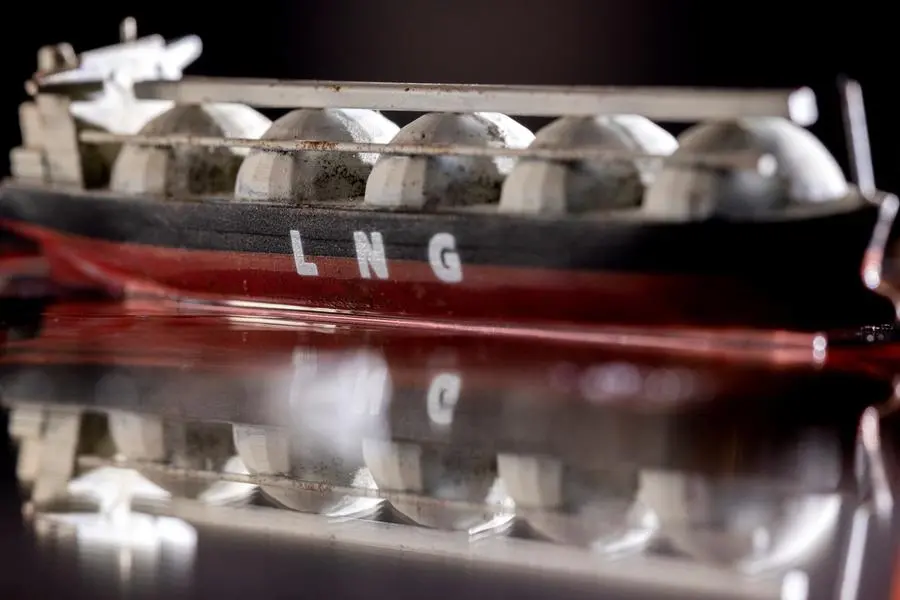PHOTO
(The opinions expressed here are those of the author, a columnist for Reuters.)
LAUNCESTON, Australia - The momentum in global liquefied natural gas (LNG) markets swung away from Europe and back to Asia in January, but the modest increase in demand wasn't enough to buoy spot prices.
Asia's imports of the super-chilled fuel rose to 24.0 million tonnes in January, up from 23.74 million in December according to data compiled by commodity analysts Kpler, making last month the strongest since January 2022.
Meanwhile Europe's imports slipped to 12.42 million tonnes in January, down from December's 13.51 million, which was an all-time high, according to Kpler.
Europe's imports remain strong by historical standards, shifted structurally higher by Russia's invasion of Ukraine, which triggered sanctions that have curtailed Russia's pipeline shipments to the continent.
Europe used to receive about 40% of its natural gas from Russia, but this figure has dropped sharply since the attack on Ukraine on Feb. 24 last year, leading to a scramble for LNG cargoes. Moscow calls its actions in Ukraine a "special operation".
In 2021, Europe's monthly LNG imports ranged from a low of 4.54 million tonnes to a high of 9.15 million. Since the Ukraine invasion they have ranged from a low of 8.8 million in August last year to December's record.
In effect, Europe has taken LNG away from Asian countries, largely by being prepared to pay more for spot cargoes, especially from swing supplier the United States, which ranks third behind Australia and Qatar among the world's biggest shippers.
However, Europe's LNG demand eased off in January amid a milder winter than usual and ample inventories.
The result was a drop in the spot LNG price for delivery to North Asia , which slipped to $18.50 per million British thermal units (mmBtu) in the week to Feb. 3, the lowest since September 2021.
The price of futures linked to S&P Global Commodity Insights Asian benchmark JKM price also slid last week, hitting a low of $18.37 per mmBtu on Feb. 2.
The spot price has been dropping as some of the main Asian buyers of these short-term cargoes have been buying less LNG.
China, which lost the title of the world's biggest LNG importer back to Japan in 2022, landed 6.12 million tonnes in January, according to Kpler, down from 7.28 million in December and 7.18 million in January last year.
While China does have long-term purchase agreements in place, it also buys spot cargoes. But it has taken lower volumes since prices rocketed in the wake of the invasion of Ukraine, culminating in a record high of $70.50 per mmBtu in the week to Aug. 25.
Another buyer of spot cargoes is India, which imported 1.46 million tonnes in January, slightly up from December's 1.33 million but below the 1.69 million from January 2022.
JAPAN BUYING
Where there was solid demand in Asia was among the more traditional LNG importers, such as Japan, which saw January arrivals rise to 6.85 million tonnes from 6.60 million in December, according to Kpler.
South Korea's imports rose to 4.95 million tonnes in January from December's 4.50 million, while Taiwan's climbed to 1.76 million from 1.69 million in December.
The question for the market is whether spot prices have dropped enough to tempt back Asian LNG buyers that were previously reluctant.
Bangladesh may buy more spot LNG cargoes in coming months, according to two officials at the South Asian nation's state gas company, reversing a decision to halt spot purchases in the face of high prices.
While a few additional cargoes heading to Bangladesh isn't enough by itself to cause a surge in demand, it's perhaps a sign that there is more interest in resuming spot LNG purchases.
It will be key to see if utilities in China, India and Pakistan also decide that prices have declined enough to make LNG imports economically viable once more.
In past years spot LNG prices have declined in the shoulder seasons between the demand peaks in the northern hemisphere winter and summer, but if there is pent-up demand for the fuel, it may limit the downside in coming months.
(Editing by Kenneth Maxwell)





















